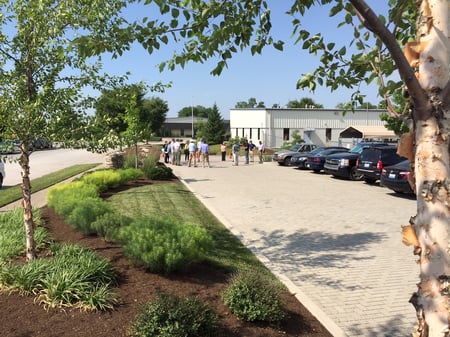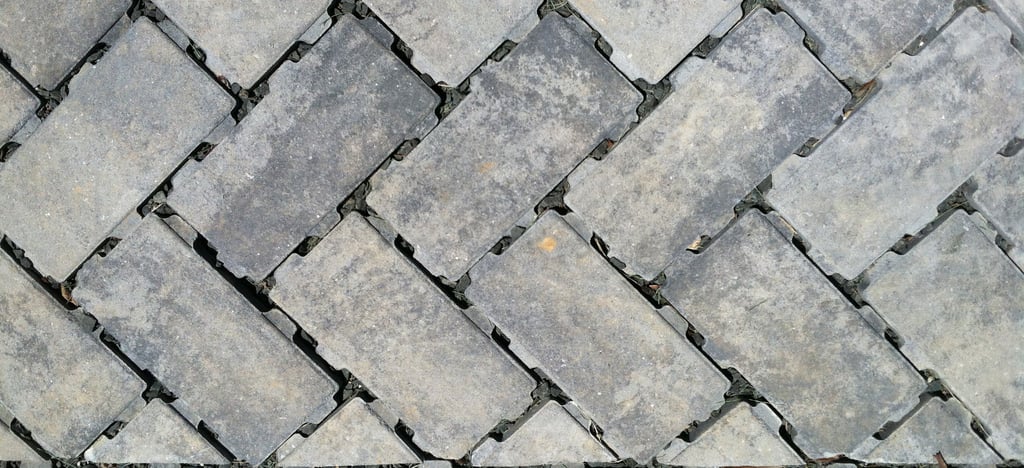Permeable pavers create a pervious surface that allows water to percolate into the ground rather than running off into stormwater systems. Permeable paving systems are comprised of a durable, load-bearing surface applied over a crushed-stone base. When rainwater lands on the pervious surface, it filters through the base and eventually infiltrates into the soil beneath it.
 Permeable paver systems are a sustainable alternative to concrete and asphalt. Ultimately, they help by reducing stormwater runoff, alleviating the burden on our public infrastructure and protecting water quality by filtering out particulates and debris before it enters our waterways. They prevent erosion and mitigate flooding. Because permeable pavers can manage heavy loads, they are ideal surfaces for parking lots, walkways and patio areas.
Permeable paver systems are a sustainable alternative to concrete and asphalt. Ultimately, they help by reducing stormwater runoff, alleviating the burden on our public infrastructure and protecting water quality by filtering out particulates and debris before it enters our waterways. They prevent erosion and mitigate flooding. Because permeable pavers can manage heavy loads, they are ideal surfaces for parking lots, walkways and patio areas.
If you’re considering permeable pavers for your Kentucky commercial property, be sure to partner with an experienced landscape provider that understands the potential challenges with installing and maintaining these sustainable surfaces. While permeable pavers are highly beneficial as green infrastructure, they do require expertise to avoid common mistakes.
Here are five common challenges we see when permeable pavers are not properly installed or maintained. (The good news: All of these errors can be avoided by hiring an expert.)
#1 Permeable Pavers: The Right Solution for the Right Location
Permeable pavers are load-bearing surfaces designed for numerous applications and they can function in high-traffic areas. However, there are limits, and permeable pavers are best avoided when vehicle loads are particularly heavy, such as in front of a dumpster pad or loading dock. That’s because pavers can settle, creating ruts in the surface when a heavy load travels the same path over and over again.
In these cases, we recommend using a combination of paving surfaces, like permeable pavers in parking stalls and asphalt or concrete in other areas.
#2 Pavers Settling Due to Inadequate Compaction During Construction
This is the most common problem we see with permeable pavers: The crushed-stone base layer is not properly compacted, therefore settling occurs and the surface buckles. Always ask the contractor what type of material they will use as the sub-base, and how they plan to ensure that the base is properly compacted before laying down permeable pavers.
For example, sub-base must be compacted in layers to ensure a proper foundation for the permeable surface. Traditional plate compactors generally compact up to 4 inches of sub-base at one time. Your commercial property will likely require a deeper base up to 30”. What we’re saying is, compaction is more than a one-step process.
#3 Not Using Triple-Washed Stone for the Base Layer
Find out what type of crushed stone will be used for the base layer of your permeable paver surface. You want triple-washed stone because this eliminates the dust and grit that comes with gravel. If not washed, that grit will clog the critical voids in your sub-base.
Clogging prevents proper water percolation and basically negates the functionality and sustainable benefits of the permeable surface. We know of at least one property in Central Kentucky that nearly made this mistake. Luckily a city representative was on-site and caught the oversight just before the wrong gravel was installed.
#4 Use Care When Plowing Permeable Surfaces
Permeable paver systems tend to collect snow and ice before other hard surfaces because cold air circulates in the voids around pavers. Pavers can be plowed like other surfaces on your commercial property, but the contractor must use a plow with “feet.” This way, permeable pavers will sustain plowing and be cleared without damage. If a plow with feet is not possible, the contractor should use a rotary broom or snow thrower to remove snow from permeable paver surfaces.
If plowing is a major concern for your property, don’t let this be a deal breaker. Design the lot to include multiple surface types with permeable pavers in parking stalls and asphalt or concrete everywhere else.
#5 Avoid Debris Collection on Permeable Paver Systems
You should routinely blow debris from parking lots, in general—and especially if they are permeable paver parking spaces. Too much buildup on the surface can prevent water from properly filtering into the paver system. As for other maintenance, permeable paver systems can be vacuumed and then “recharged” with aggregate. And, permeable surfaces should be weeded just like other hard surfaces.
Note: Be careful not to use a permeable paver surface as a temporary work zone. You’ll have to communicate this to your vendors who are accustomed to dumping aggregate materials on these pervious surfaces. Continuing this practice will cause them to clog and fail.

Partner with an Expert to Install Permeable Pavers
The multiple benefits of permeable paver systems make them a sustainable option for your commercial property if they are properly installed and maintained. We know permeable surfaces require special care. (Our headquarters includes a permeable paver parking lot.)
You can easily avoid common challenges associated with permeable paver systems by enlisting in a professional landscape provider with experience constructing and caring for these systems. Let’s talk more about how your commercial property will increase in value and “work harder” for you by including permeable pavers in the plan.
Contact us any time in Lexington at 859-254-0762, or in Louisville at 502-264-0127. Or, fill out this simple contact form and we’ll get in touch with you.


